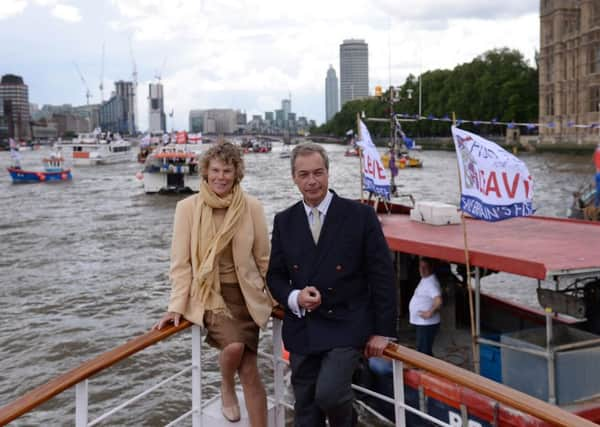Tony Lodge: Our chance to free fishing fleets from EU's hook


As the fishing boats came alongside the Terrace of the House of Commons with their Vote Leave flags and banners, MPs welcomed them and crowds gathered on Westminster Bridge. But why are these scenes so powerful and what do they symbolise?
No British industry bears more physical and social scars as a result of EU membership than fishing. Its policies have decimated once proud fishing communities.
Advertisement
Hide AdAdvertisement
Hide AdReaders of this newspaper will be aware of the damage done to the once thriving fishing fleets at Scarborough, Bridlington, Hull and Grimsby which have had to carry the burden of the EU’s Common Fisheries Policy (CFP) and its strict catch quotas.
It is important to understand just what the CFP has meant for Britain’s fishing fleets. When Britain was negotiating to join the then Common Market in 1973, its chief negotiator, Geoffrey Rippon, made a fatal concession for the industry, backed by then Prime Minister Edward Heath who was determined the join the bloc.
The original six Common Market members realised that the four countries applying to join at that time – Britain, Ireland, Denmark and Norway – would control the richest fishing grounds in the world. The six consequently drew up new regulations giving all members equal access to all fishing waters. At first the UK objected but later backed down and conceded the point.
When Britain formally joined on January 1, 1973, it had conceded an estimated four-fifths of all the fish off Western Europe. But Norway saw this as a concession too far and rejected membership.
Advertisement
Hide AdAdvertisement
Hide AdThe CFP’s demand that the UK must open its waters to other EU nations and itself be subject to strict catch quotas has had a devastating impact on not just the UK’s traditional fishing communities but also on the maritime environment.
Between 1973 and 2014, employment in the fishing industry halved from 23,476 to 11,845. This has resulted in many vessels being laid up or scrapped. In 1985 there were 11,000 fishing vessels, down to 6,300 today and between 1975 and 2014 landings of fish collapsed by 47 per cent, down from 842,000 tonnes to 451,000 tonnes.
Most significantly, David Cameron did not secure or indeed seek any changes to the CFP in his EU renegotiation. This is because it cannot be reformed.
There is no programme of the policy being changed or ended if Britain stays in the EU.
Advertisement
Hide AdAdvertisement
Hide AdA vote to leave can put the UK back in charge of its territorial waters.
Importantly the UK would be able to run a more sustainable marine stewardship policy rather than be subject to failed Brussels policies which have included the mass discarding of millions of tonnes of British fish.
When Greenland left the EU in the 1980s, it was able to strike a new free trade agreement which gave it access to the EU markets for its fish. We must end the situation where landlocked EU states like Austria have a say in UK catch quotas.
In Grimsby, a town once synonymous with fishing, the fish market and processors are today kept busy thanks to an influx of Icelandic caught cod and other white fish. There are just five trawlers in the port.
Advertisement
Hide AdAdvertisement
Hide AdFisheries Minister George Eustice visited North Lincolnshire earlier this month and said Britain should leave the EU and join the North East Atlantic Fisheries Commission.
It is extraordinary that the UK, the country with the greatest interest in the North Sea and vast swathes of the south west approaches and North Atlantic, is denied a seat in its own right because of its EU membership.
Farming on the other hand has similarly endured years of red tape, form filling and extra costs.
The Common Agricultural Policy (CAP) has promoted over-production leading to huge amounts of waste.
Advertisement
Hide AdAdvertisement
Hide AdAs with fishing, David Cameron did not include the CAP in his EU renegotiation talks despite pledging to reform the CAP at the last election.
Some in farming worry that they will lose their subsidy support if Britain votes to leave. But the statistics show the scale of the opportunity.
According to Government figures, the UK received £2.9bn in CAP funding from the EU in 2015. In the same year the UK paid in £5.6bn to the overall CAP budget. The UK therefore pays in nearly double what it gets back.
Consequently the British Government can – and will – support farmers if the country votes to leave. Importantly this would be a new policy with funds and resources better targeted in the national interest. At the moment other member states receive far more funding than the UK with France coming out on top.
Advertisement
Hide AdAdvertisement
Hide AdThe referendum on June 23 is a historic moment. It is a unique opportunity to right the wrongs of flawed negotiations, particularly in the areas of fishing and farming, agreed nearly 45 years ago.
The opportunities for readers in this region are clear.
Tony Lodge is a Research Fellow at the Centre for Policy Studies.